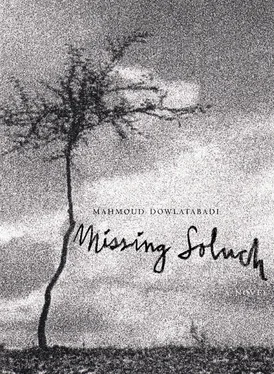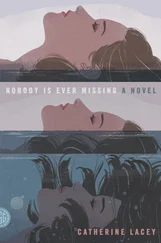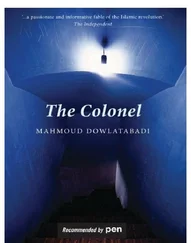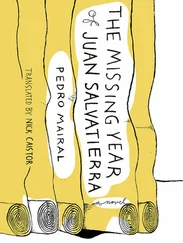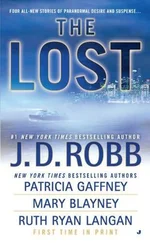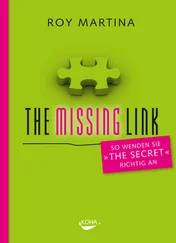Waiting for Mergan’s children to arrive, Karbalai Doshanbeh took clods of earth in his hand and crushed them between his thick, stubby fingers. When they reached him, he was still looking at the ground, which was where he usually would be found to be looking. He generally spoke little and slowly, but to great effect. The sickle and the satchel were by his hand, and he held onto a string tied around the neck of his goat, which was feeding by the stream. Mergan’s children one by one greeted him, and then went to set down what they had gathered. Karbalai Doshanbeh looked up at them, and in response to their greetings said, “So you’re gathering greens to eat?”
“Yes, Karbalai.”
Abbas and Abrau sat on the stream’s banks beside Karbalai Doshanbeh, and Hajer disappeared farther down by the water. Karbalai Doshanbeh asked about Mergan. Abbas responded, “She’s somehow getting by …”
Karbalai Doshanbeh’s voice carried sympathy. “That poor woman; see how she’s been left without protection or direction? What news is there of your disgrace of a father?”
Abrau looked down and began playing with the dirt. Abbas replied that they had no news from him yet. Karbalai Doshanbeh said, “You need to forget about him now. Whatever stories your mother’s spinning for people about Soluch sending her money … it’s not as if we live in the village of the blind! If there were news, we’d hear of it ourselves, no? Mergan’s playing the partridge — she hides her head under the snow and figures others can’t see her. She lies … She slaps her own face to make it seem red. What about your uncle, her brother? Molla Aman? Any news from him?”
“It’s been a while; we’ve not heard from him either.”
“Before all this, whenever he passed by these parts, he’d always come to see me! Now, he never comes by. Maybe he stays away and doesn’t show his face because he still needs to settle some debts he has to me? He used to work as a camel driver for me. You’re too young to remember this. But that was why I lent him some money. Those days he was in love … I didn’t know he’d not hold up his word! But now, I guess he doesn’t intend to pay. But he’ll eventually show up here one day. He can’t go and hide at the ends of the earth forever. He’ll have to come himself and repay his debt. But if you see him sometime, give him a message from me. Tell him that Karbalai Doshanbeh says, ‘I didn’t give you money to steal from me, and it’s not as if I don’t have the intention to reclaim it. It’s time for you to come and settle our accounts!’ But Mergan … Mergan’s different. Poor Mergan! She’s been burned. She was trapped by this son of a bitch Soluch, and he burned her. She never enjoyed her youth, and now it’s come to this. Tell her, from me, that if someday she needs any money or help, let me know. I won’t ask her for collateral, and I won’t charge much interest. Although … I’ll come by your house myself soon.”
Karbalai Doshanbeh rose from the ground. Mergan’s children were covered in a heavy silence, and he didn’t want to stay any longer. He could see that they hadn’t forgotten that it was his son who had gone to their house to demand payment of his own debts, and that he had later chased Abbas and Abrau from the cottonwood field. The impression of the old man’s words on their faces had also caused him to feel uneasy. Their eyes had not lit up with hope, in the way he’d expected them to. He shook the dust from his pants front and grabbed the collar of his sheep, threw its feedbag over one shoulder, and took his grass cutter in hand, and said, “There’s no worry on my part. I’ll come by your house sometime!”
Mergan’s children silently watched Karbalai Doshanbeh leaving, walking slowly and heavily as he went. He walked with wide strides. Everyone in the village knew he was bad-tempered.
Abbas rose and gathered the loose grass into his satchel. “How about we go to God’s Land?”
Abrau said, “You want us to carry these bags on our backs all the way there and back?”
“So what should we do? We can’t leave them here.”
Abrau looked at Hajer. “Will you take them?”
“Why shouldn’t she? Why would she want to come along to God’s Land?”
“So she’ll take them … You take these bags of grass and we’ll go to check the water on the land. If we can, we’ll plant some farazu .”
“When we’re ready to seed the field, we’ll also bring you to spread the watermelon seeds! Now go and bring these bags of greens to mother to cook, and we’ll be back at sundown.”
They piled the greens into Hajer’s satchel. Abrau leaned a knee onto the pile of greens and, with Abbas’ help, took up tying the edges of the satchel. Then they placed the bundle onto Hajer’s head. She stumbled a little, but held her ground, steadying her steps as she carried the load. Abbas and Abrau, relieved to know the greens were being carried home on their sister’s head, threw their own bags and satchels onto their backs, picked up their grass cutter and scythe, and headed out toward God’s Land.
* * *
God’s Land was where the sands gathered together; it was a sloping, sandy piece of earth. Smooth and soft as the belly of a mare. A fallow, windy place. Uncared for, abandoned. Perhaps this was why they called it God’s Land. Soluch’s plot was bordered by those of Morad, of Ghodrat’s father, and that of Ali Genav. To the left of God’s Land, the fallow lands continued on, while to its right a stream cut into the earth. Its upper limits bordered on the Kolghar valley, below which, as far as the eye could see, was land, land, and more land. This was God’s Land. But working such a barren land was not work for an impatient person. It was hard work. Until now, the land had only been good for growing watermelons. But lately, whispering voices had begun to speak of pistachio cultivation, despite the fact that Zaminej’s people had no background in the planting or harvesting of pistachios. But watermelons, yes, that was something they did well.
By the time the watermelon plants bore their fruits, a dusty wind would have covered them over. So one had to be patient so as to extricate the plants, leaf by leaf, from beneath the sands. And few were the people who were willing to do this hard work. Most would just sew their seeds at the beginning of spring and would leave the plants in God’s care. They’d either grow or die, and most would die under the withering wind. The plant would either be buried in the sand or would dry out. One in a hundred would survive out of sheer luck. When it was time to harvest them, a few plants would perhaps have held on, despite the winds, and bore fruits. Then it was time to wet your mouth a bit. Ripe or unripe, they’d pick the melons and leave, just happy with what they had. However, Soluch was one of the few who would go and watch over each plant carefully with a shovel in one hand.
Until the plants bore melons, Soluch was constantly and tirelessly to be found on the path between Zaminej and God’s Land. After preparing the land, he would tend the plants. This was all that was needed for the melon plants of God’s Land: just some earth. Otherwise, you could build a windbreak. A windbreak with earth and straw. This land neither needed a clod crusher nor to have its cracks filled so as to prevent the sun from stealing the moisture from the spaces. There was no need for irrigation either. But it required a great deal of work nonetheless. One needed to constantly check between the plants, and if nothing else, to weed the scrub grass with the tip of one’s shovel. This is what Soluch did. During the summer harvest, the children were his hostages. They would follow behind Mergan, treating the plants like their babies, raising them until they bore fruit, eyes full of pleasure from each and every melon.
Читать дальше
